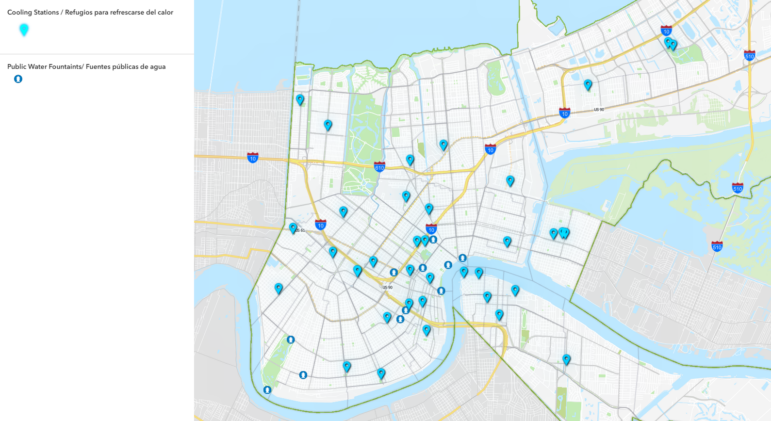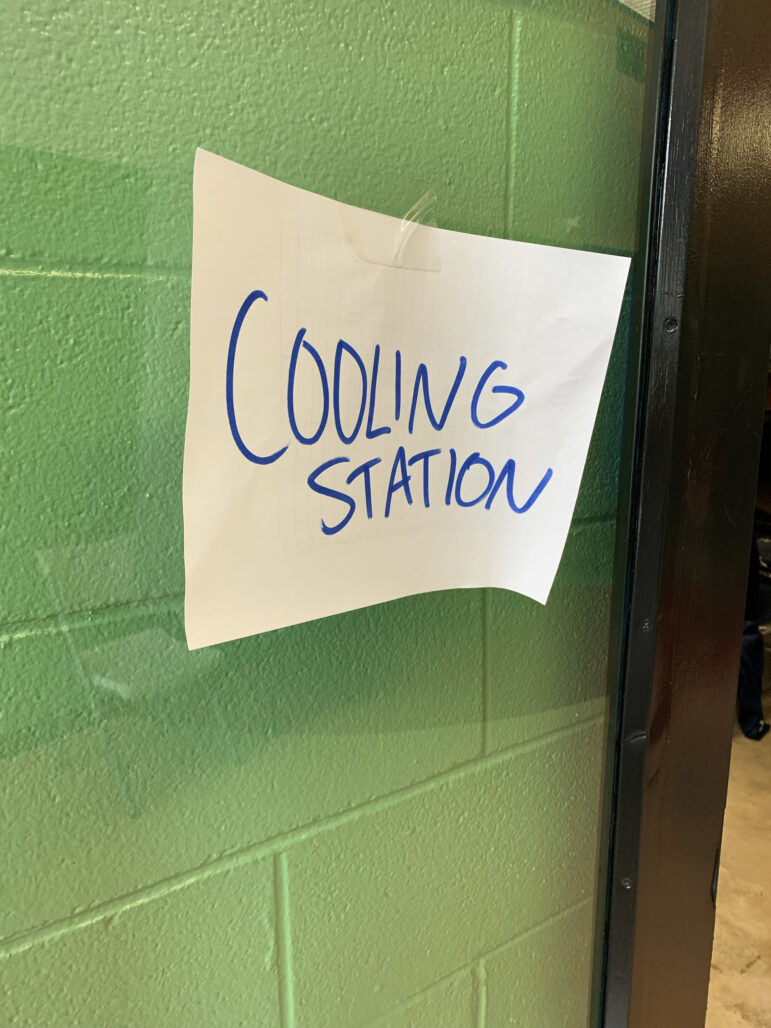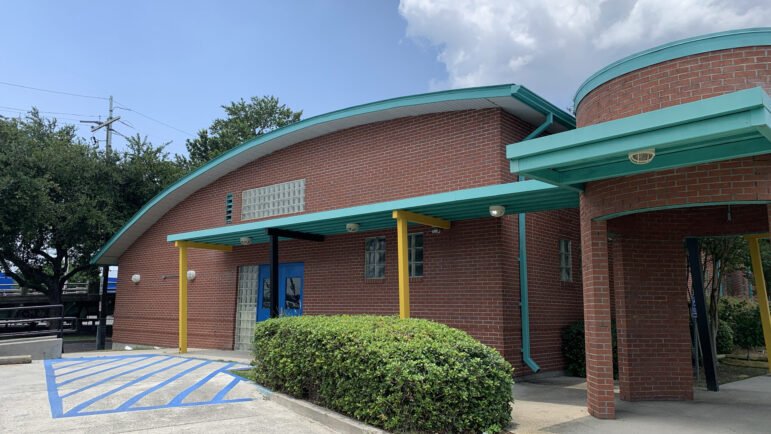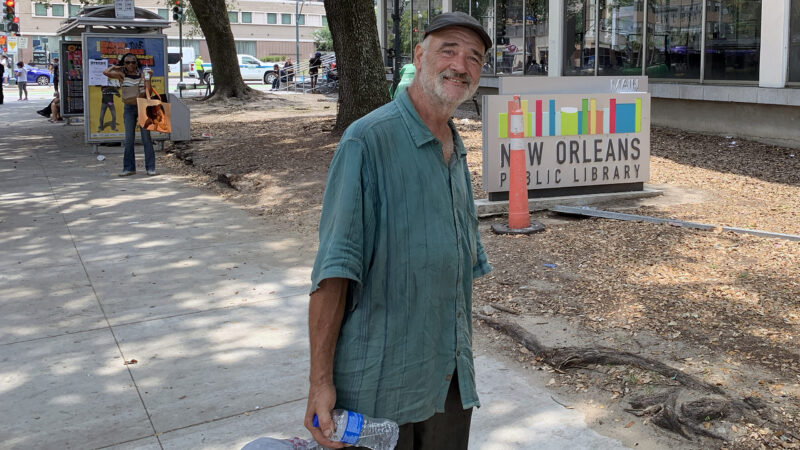As ‘overwhelming’ heat dome settles over the Gulf South, unhoused residents seek refuge
Steven, who asked to remain anonymous, stands outside of the main branch of the New Orleans Public Library, on June 30, 2023. The building has been designated as a “cooling station” during the recent heat dome.
Just after noon on the Friday before the Independence Day holiday, Steven stands outside of the main branch of the New Orleans Public Library. The heat index, or the “feels like” temperature, is well over 100 degrees Fahrenheit.
Steven is unhoused and doesn’t share his full name, but he’s come to the library on Loyola Avenue — in the heart of the city’s Central Business District — trying to get some relief from the scorching heat. The library has been designated as an emergency “cooling center” since June 17 as the Gulf South region deals with the impacts of a prolonged “heat dome” — when a ridge of high pressure traps warm air like a blanket, driving up the temperature.
The heat dome spread out over Texas, Louisiana, Mississippi, and Alabama, with the heat index getting as high as 125 degrees Fahrenheit. Officials issued “excessive heat” advisories in response, warning residents that it was unsafe to go outside. More than a dozen people have died in the region as a result of the extreme heat.
“The heat is overwhelming,” Steven said. “It takes your breath away. You can’t breathe.”
As people, like Steven, seek relief, they may run into trouble with the city’s official map of cooling stations because it isn’t always accurate.
On Friday, staff at two locations were unaware that the city listed them as cooling centers on its official map, and one, Lyons Recreation Center, had signs with arrows that pointed to other doorways as entrances for a cooling station. But, the building was closed and locked.
Anna Nguyen, a spokesperson from the city’s Office of Homeland Security & Emergency Preparedness, wrote in an email that staff at some of the city’s designated locations “may not be familiar with the term ‘cooling center,’” but that the city’s map is the best place to find heat relief resources.
On Saturday, the AC at the main branch of the New Orleans Public Library broke and the building was closed, leaving even fewer options for people to escape the heat.
Steven’s plan of attack to beat the heat starts with taking care of his to-do list for the day as quickly as he can in the mornings — usually by 9:30 or 10 a.m. Then, he heads to a cooling center to take shelter until the evening, when the temperature starts to lower again.
“You probably don’t want to live here,” Steven said. “It’s hot, it’s very hot. The air is very thick with humidity all the time.”
‘This is not an anomaly’

It seems to be getting hotter and hotter every year, Steven said, and he’s not wrong. Research shows that because of climate change, extreme weather events in the Gulf South — like heat domes — are likely to become more and more common.
Kai Kornhuber, a senior scientist at Climate Analytics who studies the impacts of extreme heat and climate events, said this trend falls in line with what climate scientists have been saying would happen in the region for decades.
These extreme heat events, he said, are “silent killers” that can have potentially devastating effects, especially for vulnerable populations like people who live and work outside.

“Many people associate sunshine and warm weather with a good time at the beach,” Kornhuber said. “but when you do outside labor and you’re just directly affected by the heat, then health impacts are often the consequence, especially under these very extreme conditions.”
Kornhuber said increasing greenhouse gas concentrations in the atmosphere that raise the average global temperature are directly linked to more frequent, longer and more intense extreme weather events — especially heat extremes.
“This is essentially only the beginning in case we’re not mitigating the emission of greenhouse gasses,” Kornhuber said. “This is not an anomaly given the climate trends that we’re observing.”
A few steps away from Steven, out in front of the New Orleans library, Frank Southall is handing out free ice-cold water and chips — along with pamphlets that list housing resources.
As the organizing and community engagement manager at Jane’s Place, a community land trust and housing rights organization, Southall is trying to connect unhoused people with support programs that can assist them while helping them cool off.
“I hear stories of people suffering from dehydration,” Southall said. “Today it was so hot, I got dizzy earlier. So, as a professional doing this work, if it’s unsafe for me, it’s deadly for people without shelter.”
In addition to bringing sweltering temperatures, the heat is melting away the “facade of equity,” revealing underlying disparities.
“Even people who have permanent supportive housing vouchers, they’re abandoning their units,” Southall said. “People who have 100% of their rent covered, because their units are full of mold, mildew, and the landlord refuses to repair the AC.”
Southall said that people in New Orleans are no strangers to heat, but these new extreme events — driven by climate change — are different. Eventually, he said, it’ll affect everyone.
“What’s happening in New Orleans is coming to you,” Southall said. “If you don’t understand it now. If you don’t understand it for your children and your nieces and nephews — this is going to impact you.”
‘This is the worst I’ve ever seen’

In addition to designating more than 30 public buildings like libraries as cooling stations, New Orleans city officials also opened up 24-hour cooling centers for unhoused people in recreation centers. Foldable cots were set up for people to stay overnight.
One such overnight shelter was set up at the Rosenwald Recreation Center on South Broad Street in the B.W. Cooper neighborhood, where about seven or eight unhoused people are staying to avoid the heat.
That included Marcus and Queen — who also didn’t feel comfortable sharing their full names. Marcus, a born-and-raised New Orleanian, said he’s prone to heat exhaustion, having passed out a few times previously when temperatures got too high. He and Queen came to the shelter out of concern for their safety after learning about it from the Salvation Army.
Marcus said the summer temperatures in the city have seemed to get “hotter and hotter” as each year passes, but this heat wave is the worst he feels that he’s experienced so far. It especially feels unbearable outside as it gets later in the day.
“I know when it’s about 12 o’clock, it’s time to take shelter,” Marcus said. “You got to go somewhere where they got AC and you can stay cool. You don’t need to be walking them streets.”
Relaxing on a cot across the room, with some powdered sugar sprinkled across his shirt, Ernesto Castillo, 63, said he’s doing whatever it takes to stay cool — including eating two pints of ice cream (along with some powdered donuts) for breakfast.
Castillo heard about the cooling stations on the news. Even though he’s lived on the streets for years, he’s never had to take shelter from the heat before.
“Well, we never had this in previous years, you know,” Castillo said. “It’s in the hundreds today at the international airport, marking again the second day.”
Growing up in the South, Castillo said summer was always something to look forward to — a time to celebrate and enjoy. But with each passing year, the temperature has gotten higher and higher. He no longer looks forward to it.
“This is the worst I’ve ever seen in life,” Castillo said.
Editor’s note: A previous version of this story incorrectly named the office spokesperson Anna Nguyen works for. It is the New Orleans Office of Homeland Security & Emergency Preparedness.
This story was produced by the Gulf States Newsroom, a collaboration between Mississippi Public Broadcasting, WBHM in Alabama, WWNO and WRKF in Louisiana and NPR. Support for health equity coverage comes from The Commonwealth Fund.
40 years after ‘Purple Rain,’ Prince’s band remembers how the movie came together
Before social media, the film Purple Rain gave audiences a peak into Prince’s musical life. Band members say the true genesis of the title song was much less combative than the version presented in the film.
Park Fire in California could continue growing exponentially, Cal Fire officer says
Cal Fire has confirmed that over a hundred structures have been damaged in the Park Fire, which grew overnight near Chico, Calif. Difficult firefighting conditions are forecast through Friday night.
Checking in with Black voters in Georgia about the election, now that Biden is out
Some voters who could be key to deciding who wins Georgia. What do they think about Vice President Harris becoming the frontrunner in the race to be the Democratic nominee?
Tahiti’s waves are a matter of ‘life and death’ for surfing Olympics
Tahiti's Teahupo'o wave has a slew of riders for the Paris 2024 Olympics. NPR finds out why it's called one of the most dangerous waves.
Researchers are revising botanical names to address troubling connotations
Since the mid-1700s, researchers have classified life with scientific names. But some of them have problematic histories and connotations. The botanical community is trying to tackle this issue.
A spectacular opening ceremony wowed a global audience despite Paris’ on-and-off rain
The Paris Olympics opening ceremony wowed Parisians, fans and most everyone who was able to catch a glimpse of thousands of athletes floating down the Seine to officially begin the Games.



